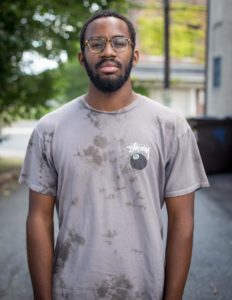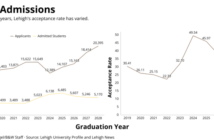
Chester Toye
A few scenes during the opening episode of Donald Glover’s new show, “Atlanta,” beautifully illustrate what I believe to be a serious issue in our country and at Lehigh: stereotyping.
Glover, who is Childish Gambino for those unfamiliar with his government name and also a black man, plays Earn. In one scene, he tries to convince a white colleague of his, who works at a local Atlanta radio station, to play his cousin Paper Boi’s new single on the radio.
During the conversation, Earn’s white friend casually uses the word “nigga” in conversation multiple times.
In one instance, he describes a terrible DJ who played Flo Rida back-to-back at a party and tells Earn he had said to the DJ, “Really, nigga?” As Earn’s friend walks away following the conversation, Earn asks a black janitor, “Hey, that guy ever say nigga around you?”
The janitor quickly responds by saying, “Yeah, right. I’d break my foot off in his ass.” Later in the episode while driving with his cousin, Paper Boi, Earn sees this same white friend and asks him to tell his cousin Paper Boi the Flo Rida DJ story.
Having personally been in situations similar to Earn, it was obvious to me that he wanted to test whether his white friend would repeat the “N-word” in front of his cousin as well. His friend tells the story for Earn and his cousin Paper Boi but leaves out the “Really, nigga?”
For those of you who have watched the show, I’m sure you’ve noticed the differences in demeanor and appearance between Earn and his cousin Paper Boi. For those of you who haven’t seen “Atlanta,” I’m sure you can imagine the possible differences that exist between Earn and Paper Boi that would lead to Earn’s white friend to use the word nigga around Earn but not in front of Paper Boi. Unfortunately, many people, including Earn’s white friend, see these differences between two people and assume one is black and one is not, reinforcing often negative stereotypes of blackness.
On a number of occasions throughout my life and specifically during my time at Lehigh, I have been in casual conversations with white friends during which the word “nigga” was nonchalantly used. The word was never used in an intentionally offensive or aggressive manner, but was upsetting nonetheless.
What is more upsetting than its use, however, is some of the responses I’ve received after getting visibly irritated and asking my white friends not to use the N-word. Most responses, to my irritation, boil down to something along the lines of: “You’re not really black. Why do you even care?”
I’m confident that if Earn had tried to tell his white friend not to say the N-word, he would’ve received a similar response.
When I hear something like this, I think to myself, what the f–k? What does that even mean? Why do I need to sit here and justify my blackness? But then I remember many people at Lehigh have had little, if any, meaningful face-to-face interactions with blacks. The only experiences many people have had with blacks is through listening to music, watching sports and watching the news, which provides a narrow, one-dimensional and one-sided view of blackness.
If these impersonal, unrepresentative, one-way interactions are all someone has had, they can easily be led to think they have the whole picture and are experts on blackness. If you have not had many meaningful conversations with a variety of black people, understand that you have only scratched the surface of the complex depths of blackness.
In most of these cases, the variables used in someone’s computation of my blackness, or lack thereof, include my family’s economic circumstances, the fact that my parents are married, my use of the English language, my hobbies and activities, my academic performance and intelligence and my wardrobe.
Here are a few examples of how I’ve had these “indicators of blackness” presented to me: “You don’t sound black.” “You’re not poor so you’re not really black.” “Black people don’t play lacrosse.”
These might sound like silly, harmless statements, but they can be and have been scarring. Statements like these are an attack on an important part of my identity: being black.
First, while talking to your black friend and just when talking in general, don’t use the N-word. Second, never question or invalidate someone’s blackness. Lastly, if you meet someone who challenges your personal idea of blackness, get excited because your stereotypes are being broken down.
—
Chester Toye, ’19G, is a columnist for The Brown and White. He can be reached at [email protected].





Comment policy
Comments posted to The Brown and White website are reviewed by a moderator before being approved. Incendiary speech or harassing language, including comments targeted at individuals, may be deemed unacceptable and not published. Spam and other soliciting will also be declined.
The Brown and White also reserves the right to not publish entirely anonymous comments.
2 Comments
The problem is with people who dehumanize people, they are shallow. Most of us are shallow and not willing to open up to individuals…Sad!
Why is it bad to use the word ‘nigga’ even though it’s used all across pop culture and rap music? Especially because the word has evolved into something completely different from the ‘hard R’ version. Why do people have to get offended from something that isn’t meant to be offensive in 99% of cases? That just creates more division. Where’s the article about denouncing rappers from saying it and making it commonplace in American vernacular? Enough of this ‘boy who cried wolf’ excessive victimization.